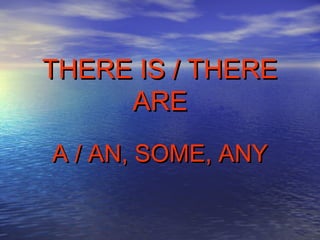
There is... a,an...some any...
- 1. THERE IS / THERE ARE A / AN, SOME, ANY
- 2. En inglés, existen dos formas de expresar el verbo haber (hay).
- 3. short affirmative negative interrogative answers Yes, there Is there is. Singular / there is uncountable isn’t there…? No, there isn’t. Yes, there there Are plural there are are. aren’t there…? No, there aren’t.
- 4. There is + sustantivo There are + sustantivo contable en singular y plural + sustantivo incontable • There is a man. • Hay un hombre. • There isn’t any water. • There are some dogs. • No hay agua. • Hay algunos perros.
- 5. A = un, una An = un, una
- 6. A + sustantivo singular en AN + sustantivo singular en oraciones afirmativas, oraciones afirmativas, negativas e interrogativas negativas e interrogativas cuando el sustantivo cuando el sustantivo comienza por consonante comienza por vocal • There is a car. • There is an elephant. • Hay un coche. • Hay un elefante.
- 7. some = unos / -as, algunos / -as any = unos / -as, algunos / -as ningunos / -as
- 8. SOME+ sustantivos en ANY + sustantivos en plural plural en oraciones en oraciones negativas e afirmativas interrogativas • There are some cats. • There aren’t any pets. • Hay algunos gatos. • No hay ninguna mascota. • There are some books. • Are there any girls? • Hay algunos libros. • ¿Hay alguna chica?
- 9. THE DEEP OCEAN Imagine: You’re on a boat in the middle of the Pacific Ocean.
- 10. It’s hot and sunny. There isn’t a cloud in the sky.
- 11. You go down into the water in a special submarine.
- 12. At 10 metres underwater, it’s warm. There are some plants and some fish.
- 13. At 1000 metres underwater, it’s cold and dark.
- 14. At 2000 metres underwater, you’re on the ocean floor. It’s very, very cold.
- 15. There aren’t any plants. But – incredibly – there are some animals here.
- 16. There are some holes in the floor of the Pacific Ocean. Very hot water (400ºC) comes out of the holes, and some amazing animals live there.
- 17. There’s a special type of worm and there are some snails, too.
- 18. Sometimes, the worms are three metres long. The snails haven’t got any eyes, but they’ve got hair!
- 19. Are there any plants at 10 metres underwater? Yes, there are.
- 20. Are there any fish at 10 metres underwater? Yes, there are.
- 21. Are there any plants on the ocean floor? No, there aren’t.
- 22. Are there any animals on the ocean floor? Yes, there are.
- 23. Is there a special type of worm on the ocean floor? Yes, there is.
- 24. Are there any dolphins on the ocean floor? No, there aren’t.
- 25. There is a worm.
- 26. There are some holes.
- 27. There is a submarine on the ocean floor.
- 28. There is a special kind of snail.
- 29. There are some plants at 10 metres underwater.